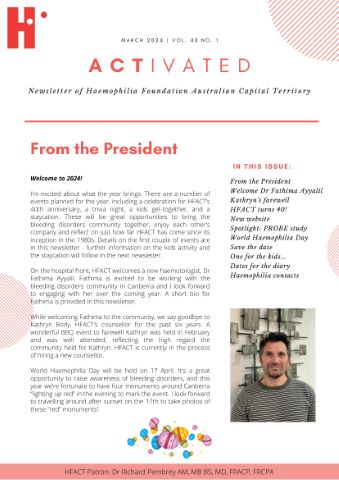‘I felt like I had won a million dollars.’
What is it like to be cured of hepatitis C after decades of living with the virus? Alex spoke with HFA about his hep C journey – and shares his tips for liver health.
Alex has von Willebrand disease (VWD), a bleeding disorder which requires specialised treatment to manage bleeding with injury or surgery. He acquired hepatitis C as a boy when he had a tonsillectomy and was treated with cryoprecipitate to prevent bleeding.
Cryoprecipitate is made from the plasma part of human blood. In the 1980s many people with bleeding disorders were exposed to hepatitis C virus (HCV) through their treatments with blood products and plasma-derived clotting factor concentrates. By 1993 increased safety measures had been introduced in Australia: new tests to screen for HIV and HCV in the blood supply and viral inactivation manufacturing processes for bleeding disorder treatment products.
GROWING UP WITH HEP C
Alex was advised he had hepatitis C when he was still a schoolboy.
‘This was all during the time when HIV and the Grim Reaper was a big thing. I felt a huge sense of shame and didn’t tell a single soul. My family knew but we didn’t really talk about it.’
Having VWD, nosebleeds and cuts which would bleed a lot made him very anxious about transmission – at home with his family, with his friends and in his workplace. Added to that were the symptoms of hep C, which made managing work challenging.
‘Some of the symptoms of the virus were lethargy and fatigue. At times I was between jobs and it was really hard dealing with Centrelink. In one job I had to handle food. I was paranoid about cutting myself and putting blood in the food and stressed about my co-workers knowing my status. I had to be careful not to cut myself and if I did, I had to make sure no one helped me.’

EARLY TREATMENTS
Alex undertook treatment for his hep C several times.
He had the early interferon-based treatments twice, in 1993 and 2008, and neither were successful. These treatments were well-known for severe side effects, including psychiatric problems, and had a heavy toll on his mental health and his relationships – in both cases he broke up with long-term girlfriends at the time.
‘The interferon was really difficult – it was bad, just wretched. I was really unwell mentally and the treatment wasn’t working. With the first treatment I lasted less than 8 weeks. With the next treatment in 2008, I did about half of the treatment course, around 3 months.’
A CURE
‘When the new treatments became available in 2016, I was one of the first in line. The new treatments are completely different – just pills, no injections. No side-effects. Just boring really, but so successful! I was cleared of the virus in 6 weeks. I was prepped for the usual trauma of treatment, but after 6 weeks of treatment they said you can stop taking the drugs because you don’t have the virus anymore. I was cured.’
‘I had another fibroscan, did some more follow-up with the liver clinic for two years and the tests showed my liver was repairing itself. The liver clinic told me I didn’t need any further follow-up – I was fine.’
‘The new treatment was a godsend – I felt like I had won a million dollars.’
‘After I was cleared, my career took off. I started getting work. I stopped getting sick all the time. Now I don’t have a chronic illness, a ‘death sentence’ – I have a future. I thought about having hep C every day for 30 years. Not having to think about having infected blood and having the weight of that removed – amazing! It’s weird!
LIVER HEALTH TIPS
Before he was cured, Alex gave up drinking alcohol to optimise his liver health.
‘I was having regular appointments and fibroscans with the hep C clinic and I only ever had moderate scarring. I stopped drinking altogether for a decade. The improvement in my liver function was really noticeable.’
‘With alcohol the social expectation was the hardest. It was all or nothing for me. But after 10 years I saved enough cash for a deposit on a house!’
His tips?
- Have an excuse for not drinking or drinking light beer – be the designated driver
- I would say no, I don’t drink when people pressed me. And if I implied I had problems with alcohol, people would back off really quickly and say, yeah, I get it, no worries, mate.
- People often don’t question you if you already have a drink.
- Having a drink of anything in my hand – a soft drink or a water – meant I wouldn’t need a drink because I had a drink.
- Ask for a dry ginger ale or a coke in a whisky glass and it looks like a scotch or a scotch and coke.
- A dry ginger ale in a pot glass with a few sips taken looks like a beer.

And now?
‘I could probably improve my diet and drink less alcohol but I exercise quite a lot. I stopped smoking – less to worry about. I do have regular blood tests with my doctor and my liver function tests are all totally fine. My health has improved generally – I barely get sick anymore.’
HIS MESSAGE TO OTHERS
‘If you have had hep C, you’re not alone. It’s a medical condition. It’s OK to not speak about it, but just so you know, you are surrounded by plenty of other people not speaking about it.’
‘Being clear of the virus is quite amazing.’
‘So reduce your alcohol intake, get treated and love yourself. It doesn’t matter how you got it – you are not your virus. You are a beautiful soul.’
Thanks to Alex for sharing his hep C journey.
*Alex is not his real name


